 Leading Blog | Posts by Month |
 Leading Blog | Posts by Month |
09.30.10

LeadershipNow 140: September 2010 Compilation
Posted by Michael McKinney at 07:39 AM
09.24.10

It’s All About You???In another fine offering from Bob Sutton—Good Boss, Bad Boss—he makes this attention grabbing statement: “To be a great boss you’ve got to think and act as if it is all about you. Your success depends on being fixated on yourself.” What?Ironically, great leaders know that it’s all about them because it isn’t. Great leaders focus on developing themselves so they can develop others. They know themselves first so they can understand others better. They check their own ego so they can build others. They take responsibility for their own actions before they consider looking at others. They have taken an inventory of their strengths and weaknesses so that they know where they need to check themselves and where they need to partner with others. They understand their own failings so that they are more understanding of others. They are appreciative of the room they have been given to grow and make certain they create this space for others. It’s about self-awareness. A self-aware leader is in a better position to lead others with authenticity and benevolent concern. Self-aware leaders know how they are coming across to those they lead. Sutton writes, “If you are a boss, your success depends on staying in tune with how others think, feel, and react to you.” Sutton offers two acid tests for bosses:
Posted by Michael McKinney at 05:25 PM
09.22.10

quickpoint: The Perils of the Comfort Zone Author and pastor C. Neil Strait (1934-2003) once wrote, “The convenient way is not always the best way. It may lead through an avenue of comfort that robs us of integrity. Or it may take us through the tunnel of compromise, where our courage is weakened. And, after all, convenience is such a fleeting thing, but integrity and courage are vital ingredients for living.” Author and pastor C. Neil Strait (1934-2003) once wrote, “The convenient way is not always the best way. It may lead through an avenue of comfort that robs us of integrity. Or it may take us through the tunnel of compromise, where our courage is weakened. And, after all, convenience is such a fleeting thing, but integrity and courage are vital ingredients for living.”
Strait is right. Our comfort zone can compromise us. And if we are not careful, our comfort zone becomes our answer for everything because it becomes the mindset we operate from. Eventually it kills our curiosity, our creativity and our opportunities. What are you doing for the sake of convenience—because it's easier—that is holding you in unhealthy patterns of behavior and limiting your thinking?
Posted by Michael McKinney at 09:12 AM
09.20.10

Do You Argue With Reality?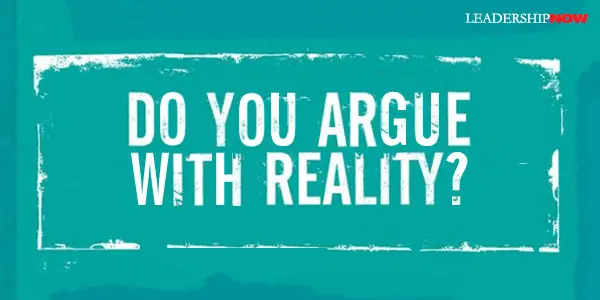
CHRIS THURMAN wrote in The Lies We Believe, “The number one cause of our unhappiness are the lies we believe in life.” Too often, we operate apart from reality. Given a choice between reality and our version of it, we are inclined to choose the latter. It is a central tendency of human beings. The result is drama, not peace. “Instead of getting the results we want,” says Cy Wakeman, “we end up with reasons, stories, and excuses for why things didn’t work out—leading to more drama, disengagement, judgment, and ineffective leadership.” In Reality-Based Leadership, Wakeman presents a much-needed wake-up call. We can ditch the drama by getting in touch with what is. Quit making up stories. Quit arguing with reality. Ditching the stories that are causing us stress. “We all tell ourselves stories and live with the resulting drama.” It sounds like:“I shouldn’t have to do this—it’s not part of my job description.
“You are arguing with reality whenever you judge your situation in terms of right and wrong instead of fearlessly confronting what is.” You need to respond to the facts, not the story you create about the facts. This is easier said than done. Interwoven in our stories are our egos, insecurities, and identities. (At one point Wakeman suggests we ask, “Who am I as a manager or as an employee when I believe this story?”) We like our stories. They make us look better. They place the blame somewhere south of us. If other people are always coming up short in our stories, then it’s all about us. But letting go of our stories is not always easy as we have a lot invested in them. Too often our criticism is about setting us apart from others and not about helping them. It says a lot more about us than it does those it is directed towards. Wakeman says, “When you are judging you are not leading.” In her analysis of the case study about Steve and a team he dreaded working with, she concludes, “his biggest obstacle is his belief that they are a negative group. What if he just dropped that whole story and simply responded to reality directly? The phone rings? Answer it. The team ask a question? Answer it, or teach them where to find the answer. The team share what worked in the past? Listen and lead them into the future. The team requests some time with the leader? Engage with them—lead! When Steve began to lead the team rather than judge and criticize, the team began to change for the better.” She adds, “When you focus your energy on what you are able to give And create rather than what you receive, you are truly serving.” Do you see any applications in what you and involved in? Wakeman insightfully writes: “What is missing from a situation is that which you are not giving.” Operating out of a judging mindset of “I know” or “I am right” effectively shuts down the potential to learn or accomplish anything. Moving on based in reality requires setting the story aside and asking, “If I set the story aside, what would I do to help?” The minute you start judging is the very minute you quit leading, serving and adding value. When you’re in judgment, you are dealing with your story—not with reality. Wakeman suggests that when you get off-track:
What stories are you telling yourself that cause you to operate in your own world? While it may be cognitively economical, it is costing you far more in every other area. 
Posted by Michael McKinney at 03:54 PM
09.17.10

The Reality-Based Leader’s Manifesto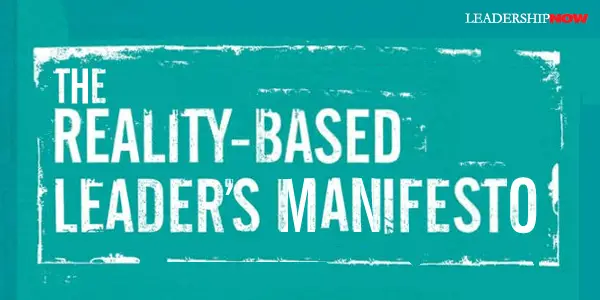 “If you believe that leadership is tougher today than it was in the past, you’re not alone,” writes Cy Wakeman, author of Reality-Based Leadership. “We are living and working in dramatic and demanding times, but that is not our biggest problem. The source of our pain is the absence of great leadership that is based in reality. …The future belongs to the leader who is able to change the way people think and perceive their circumstances, the leader who engages hearts and minds.” To that end, she offers the Reality-Based Leader’s Manifesto:
“If you believe that leadership is tougher today than it was in the past, you’re not alone,” writes Cy Wakeman, author of Reality-Based Leadership. “We are living and working in dramatic and demanding times, but that is not our biggest problem. The source of our pain is the absence of great leadership that is based in reality. …The future belongs to the leader who is able to change the way people think and perceive their circumstances, the leader who engages hearts and minds.” To that end, she offers the Reality-Based Leader’s Manifesto:

Posted by Michael McKinney at 07:07 PM
09.15.10

Timeless Advice from a Father to a Daughter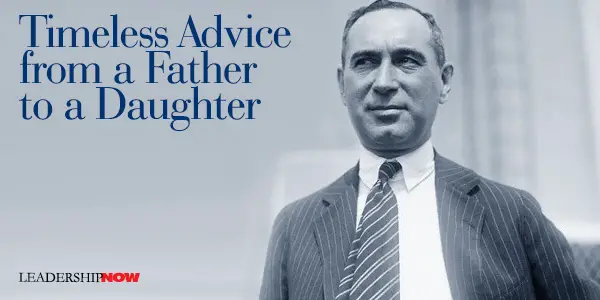
The Man Who Sold America by Jeffrey Cruikshank and Arthur Schiltz was for me, hard to put down. It is the retelling of the inspiring and remarkable life of Albert Lasker (1880-1952). Lasker has been called the “father of modern advertising.” He had an eye for talent and worked with them to transform the advertising agency from mere brokers to a creative force to build businesses. He developed “reason why” advertising—salesmanship in print. He made Palmolive and Pepsodent household names and invented the "Sun-Maid" and "Sunkist" brands. He made millions for Quaker Oats, Goodyear, Frigidaire, Lucky Strike and Kimberly-Clark and in the process made millions for himself. He advanced millions to friends during the Depression (most of the loans were never repaid) and when prudent, loaned money to clients to finance their advertising campaigns. Lasker was a major investor in the Chicago Cubs. He persuaded William Wrigley to join him in investing in the team. To help the chewing-gum magnate sell more product he pushed to change the name of Cubs Park to Wrigley Field. 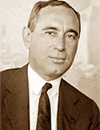 Aided by his personal relationship with many leading businesspeople he “applied the insights he gained in one context to give advice in others.” The legendary David Sarnoff of RCA said of him, “Give him an equal knowledge of the facts and I’d rather have his judgment than anybody else I know.” On October 29, 1935, his daughter Mary came to work for him at Lord & Thomas. He left a note on her desk on her first day of work: My darling Mary,Just One More: In 1938, Lord & Thomas hired the obscure comedian Bob Hope to pitch Pepsodent on the radio. Although Lasker enjoyed making and consorting with the stars—and in one case, marrying them—he remained largely unimpressed with them. One day, the head of Lord & Thomas’ broadcast department reported to Lasker that Hope was grumbling about his contract with the agency. “Mr. Lasker,” the subordinate said, “Bob is very unhappy. He says he just can’t put the show together for $4000 a week. He must have $6,000.” “Just between us,” Lasker replied dryly, “I’d rather have Mr. Hope unhappy at $4000 than unhappy at $6,000.”   
Posted by Michael McKinney at 09:16 AM
09.14.10

Leading Views: Five Essential Leadership Questions In The Mirror Test author Jeffrey Hayzlett reminds us that “having the mindset of a leader is more important than learning tactics of leadership that fill thousands of books and seminars nationwide. After all, tactics can change and vary depending on where your business is and they type of business it is. The need for strong leadership does not. Success and growth depend on it. Your employees depend on it. The mood of your company depends on it." In The Mirror Test author Jeffrey Hayzlett reminds us that “having the mindset of a leader is more important than learning tactics of leadership that fill thousands of books and seminars nationwide. After all, tactics can change and vary depending on where your business is and they type of business it is. The need for strong leadership does not. Success and growth depend on it. Your employees depend on it. The mood of your company depends on it."
So the first question you need to ask, says Hayzlett, is not “How do you lead?” but “Can you lead?” If yes, then ask the following:
Posted by Michael McKinney at 06:30 PM
09.13.10

It’s Not Just Who You Know—It’s Who You Are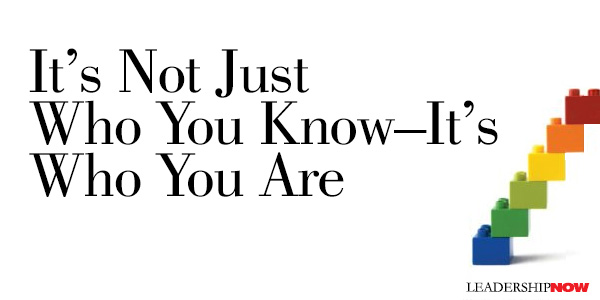
BUILDING relationships is about others. It’s more than networking says Tommy Spaulding. “When a heart centered on others drives your actions, networking is replaced by something far, far more powerful—Netgiving. Networking is all about you. Netgiving is all about others.” It's from this sound perspective that Tommy Spaulding writes It’s Not Just Who You Know. It’s Not Just Who You Know is both an inspiring biography and a lesson in initiative and building genuine relationships. Quite often we meet people and build relationships by chance; Spaulding doesn’t believe we should leave them to chance. He has seen over and over again that “an investment in a short-lived and seemingly random encounter can produce unforeseeable yet significant benefits.” So we need to “develop an attitude of openness” and approach “every person we encounter with an awareness of the hidden potential to develop a relationship.”Spaulding thinks of relationships in terms of a five story building. Level 1 is purely transactional—meet and greet. Level 2 you share basic personal information. Level 3 relationships, while superficial, relationships have developed an emotional comfort level that goes beyond sharing facts, news weather and sports and involves sharing opinions and feelings with others. Level 4 relationships are marked openness and candidness. We respond in ways that show that we value the relationship for its own sake. The relationship reflects an ability to work through and a willingness to at times, put others interests above your own. Level 5 relationships are our closest and most intimate relationships. They are based more on giving than on getting. “They are relationships based on a shared empathy—an intuitive understanding of each other's needs, even those that aren't necessarily expressed…. In Fifth Floor relationships, we become confidants, advisers, and partners in helping the other person achieve their greatest potential.” Spaulding says the goal is to be able to develop the ability to build relationships at all five levels and he offers practical advice for expanding our relationships. It’s not done though through manipulation. Motives matter. Relationships built on getting what you can from others have no lasting value and will more than likely collapse when you need them the most. You can judge your motives by filtering them through the following traits: authenticity, humility, empathy, confidentiality, vulnerability, generosity, humor and gratitude. In building genuine relationships, says Spaulding, who you are is far more important than what you do. Some of his advice:
As important, Spaulding offers five relationship warnings such as choose wisely and the relationship cancer you must avoid at all costs. He says that Dale Carnegie’s How to Win Friends and Influence People taught him how to get people to fall in love with him. But there is more. We can fall in love with others if we remember it’s not about us. It’s not just who you know—it’s who you are. 
Posted by Michael McKinney at 01:08 AM
09.06.10

Getting Ideas to Flow
Charles Landry is the founder of Comedia, and works to help cities to be more "creative for the world" so that the energies of individuals and companies can be brought into alignment with their global responsibilities. He recently told Sally Helgesen that his experience has taught him that “the single biggest problem in the world is not finding great ideas but getting great ideas to move, to flow.” Getting stuck is an issue we face both individually and organizationally. At its core, it’s a thinking problem and is often self-inflicted. Creating the right kind of movement and in the right direction begins with re-thinking our view of reality. If we keep applying the same patterns of thinking even after they have been shown to be counterproductive we skew our perception of even everyday life situations and block the flow of growth, ideas, and influence. Here are some common areas we need to rethink to get ideas to flow: Re-think complexity. We create complexity by over-analyzing our situation; creating issues where there are none; forgetting our purpose. Complexity obscures the issues. Keep the issues as uncluttered as possible. Often an outsider can see the situation and the real issues more clearly than you can. Try asking, “Am I making this a bigger problem than it is because of fear, insecurity or lack of knowledge?” “Is this really a problem to be solved or a tension to be managed?” Stick to what needs to be addressed. Complexity can lead to procrastination. Re-think systems. Trying to create a new vision without addressing old systems is at best counterproductive. Tenaciously grasping the old ways of doing things just because that is what you have always done, can stop the flow of ideas and innovative solutions and lead to hopelessness. If you are experiencing a chronic lack of movement, a resistance to change or lack of compliance to your “really good idea,” you probably have a system in place that discourages the very behavior you seek. A system should reward the behavior you want. What systems are getting in your way? Re-think ego. Our ego frequently keeps us from exploring new ideas. We get so invested in what we have done that we can’t get out of our own way. We keep retrying to work the old and deceive ourselves into thinking we’re making progress when all we are doing is rearranging the deck chairs on a sinking ship. Sometimes we need to set aside our ego and simply abandon what isn’t working and start over with a better design. Re-think boundaries. Think bigger. Think interdisciplinary. Growth often involves blurring boundaries to open your mind to new possibilities. What principles outside of your world of experience could expand the possibilities for your idea? Re-think reactions. Repetitive reactions are the result of ingrained patterns of thinking that we have hard-wired into our brains long ago. Take the time to reflect on why you think the way you do; why you do what you do. Default patterns of thinking lead to more of the same. Ask yourself, “Is this working for me?” Think about the unspoken. Re-think failure. If you’re afraid of being wrong, embarrassed by failure or paralyzed by insecurity, you will never find the solutions that lead to meaningful growth. Failure provides the nutrients for growth when we respond to them positively. Keep failure in perspective, it’s a regular part of life. You can’t avoid them so learn to work with them. Failures help you to raise the bar and reorient your thinking to possibilities and new ways of thinking. Re-think success. Know what success looks like. How will you know when you have arrived? Muddy expectations lead to exhaustion and defeat before you even get started. Praise short-term accomplishments to appeal to your heart and not just your head. It will keep your ideas moving along.  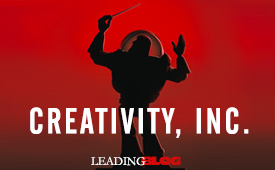
Posted by Michael McKinney at 03:16 PM
09.03.10

5 Leadership Lessons: Lessons From Warren Buffett’s Top Business Leaders “My father taught me that it is difficult to control others’ perceptions, but I can always control my own actions, and these actions can, over time, alter those perceptions. I constantly show my colleagues that I am an active listener, and I make sure to explain my rationale for every decision and to consider their opinions. That is all I can do, because the reality is that it will soon become clear whether or not I am capable.”
Posted by Michael McKinney at 12:12 AM
09.01.10

First Look: Leadership Books for September 2010Here's a look at some of the best leadership books to be released in September.




For bulk orders call 1-800-423-8273 "An ordinary man can … surround himself with two thousand books … and thenceforward have at least one place in the world in which it is possible to be happy." —Augustine Birrell (1850-1933)
 Build your leadership library with these specials on over 160 titles. All titles are at least 40% off the list price and are available only in limited quantities.
Posted by Michael McKinney at 07:58 AM
|
BUILD YOUR KNOWLEDGE


How to Do Your Start-Up Right STRAIGHT TALK FOR START-UPS 
Grow Your Leadership Skills NEW AND UPCOMING LEADERSHIP BOOKS 
Leadership Minute BITE-SIZE CONCEPTS YOU CAN CHEW ON 
Classic Leadership Books BOOKS TO READ BEFORE YOU LEAD |
|